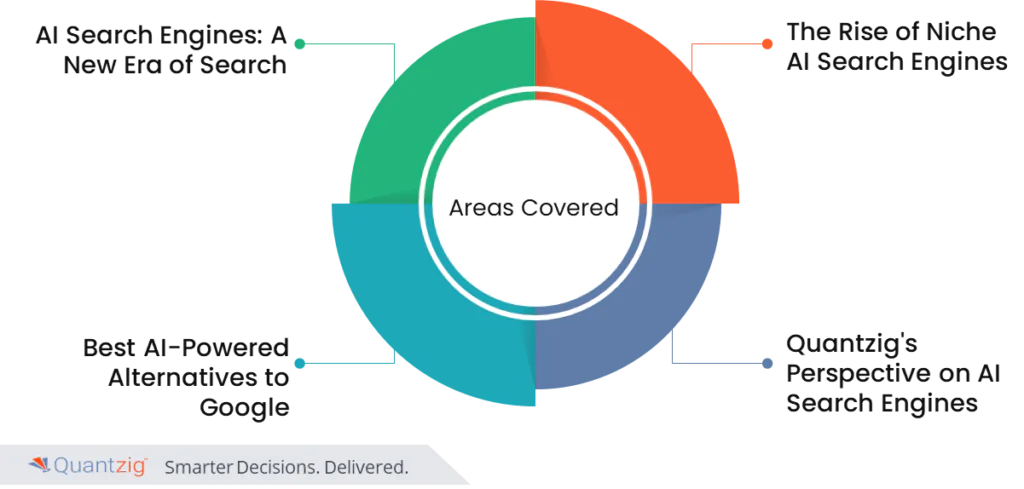The dominion of online search is undergoing a renaissance with the advent of Artificial Intelligence (AI). In an age where data reigns supreme, Quantzig recognizes the transformative power of AI-enhanced search capabilities. This article ventures into the realm of AI search engines, spotlighting pioneering alternatives to Google that are redefining the future of digital search practices.

Table of Contents
AI Search Engines: A New Era of Search:
The advent of AI search engines marks a pivotal change in the digital search landscape. Far surpassing the capabilities of traditional search platforms, these AI-driven engines offer an unprecedented level of personalization and context sensitivity. By harnessing the sophisticated algorithms of machine learning, engines such as Bing with its AI enhancements and privacy-conscious DuckDuckGo are not merely responding to queries but understanding user intent, delivering tailored results, and evolving through continuous learning from each interaction. This evolution represents a leap towards a more intuitive and user-centric search experience.
Best AI-Powered Alternatives to Google:
- Bing’s AI Enhancements: Bing has embraced Microsoft’s cutting-edge AI to refine and extend its search capabilities. With features such as voice recognition and sophisticated image searches, Bing is emerging as a formidable rival to Google’s dominance.
- DuckDuckGo: Championing user privacy, DuckDuckGo employs AI to furnish relevant search outcomes without the customary tracking of user data, promising a more secure and confidential search experience.
- Ecosia: Standing out with its eco-conscious mission, Ecosia’s AI-driven search engine not only provides accurate search results but also contributes to global reforestation efforts with its profits, combining technological innovation with environmental activism.
The Rise of Niche AI Search Engines:
Specialized AI search engines are carving out their own niches, catering to specific needs and domains. Wolfram Alpha, for instance, uses computational intelligence to address complex academic and scientific inquiries, becoming a staple for researchers and students. Similarly, Yandex utilizes its prowess in language processing to serve Russian and Eastern European languages, demonstrating the global reach of AI search technology.
Quantzig perceives the ascension of AI search engines as more than a technological trend; it’s a transformative shift in how information is accessed and engaged with online. These AI-driven platforms are not just alternatives but are setting the stage for a future where search experiences are highly personalized, efficient, and ethically responsible. Our analytical insights into these technologies emphasize their role as key drivers in the evolution of search engine technology.
Conclusion:
The AI search arena is rapidly advancing, forging paths that deviate from the established norms set by traditional search engines like Google. Quantzig’s comprehensive analysis of this dynamic field accentuates the significant potential of AI-powered search engines to transform our interaction with the wealth of information available online. As these technologies continue to advance, they are poised to become an integral part of our digital existence, offering enhanced search experiences characterized by speed, accuracy, and intelligence.


